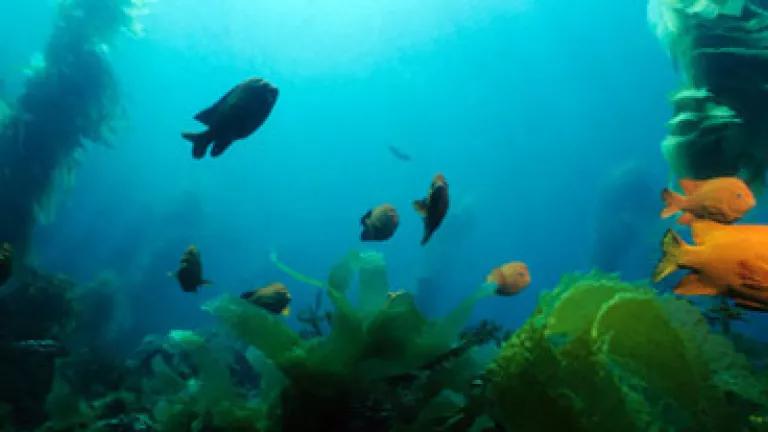
This week marks the 10th anniversary of a groundbreaking report from the Pew Oceans Commission, which boldly called for increased ocean protections to save our fragile blue planet. America’s Living Oceans: Charting a Course for Sea Change exposed how we had reached a crossroads in our relationship with vulnerable ocean life and ecosystems—one where only smart policies and actions keep our ocean resources healthy and thriving for generations to come. As we approach World Oceans Day this Saturday, June 8th, it’s useful to reflect on what’s been accomplished in the last ten years and some of the challenges we continue to face.
The Pew report drew on the knowledge and experience of an impressively diverse group of stakeholders. Chaired by Honorable Leon E. Panetta, the Pew Oceans Commission included 18 other individuals, including two sitting governors, one former governor, one mayor, the first American woman to walk in space, several leading scientists, two commercial fishermen, and NRDC’s then-President John Adams.
Together, the Commission concluded that the nation needs to ensure healthy, productive, and resilient marine ecosystems so that the jobs, recreation, and food provided by these resources are available for present and future generations. In other words, America’s economic sustainability in the long term depends on healthy ecosystems.
To achieve and maintain healthy ecosystems, the Pew Oceans Commission found that we must extend an ethic of stewardship toward the oceans and treat our oceans as a public trust. As a result, the Commission recommended that the nation realize five priority objectives:
- Declare a principled, unified national ocean policy based on protecting ecosystems health and requiring sustainable use of ocean resources;
- Encourage comprehensive and coordinated governance of ocean resources and uses;
- Restructure fishery management institutions and reorient fisheries policy to protect and sustain ecosystems on which fisheries depend;
- Control sources of pollution, particularly nutrients, that are harming marine ecosystems; and
- Protect important habitat and manage coastal development to minimize habitat damage and water quality impairment.
In the ten years since the release of the Pew Ocean Commission’s report, we’ve made significant progress, with much still to be done. Here are examples of significant actions taken to advance these objectives:
In 2010, President Obama established the nation’s first-ever National Ocean Policy, to advance the protection and sustainable use of our ocean resources. The policy created a National Ocean Council, bringing together for the first time the various federal entities involved in ocean management to better coordinate their ocean governance and implement the policy.
In April 2013, the National Ocean Council issued the final National Ocean Policy Implementation Plan spelling out the actions that federal agencies have committed to taking in order to implement the National Ocean Policy. These actions cover a range of issues from coastal habitat protection and restoration to ecosystem-based management, climate adaptation, and ocean acidification.
Efforts to coordinate ocean planning across jurisdictions are moving ahead in many regions of the country. For example, regional efforts are moving forward through regional ocean partnerships among coastal states, and through the establishment of regional planning bodies made up of federal agencies, states, and tribes in the Northeast, Mid-Atlantic, Caribbean, and Pacific Islands.
Many of the nation’s ocean fisheries are making a big comeback thanks to the Magnuson-Stevens Fishery Conservation and Management Act. The 2006 amendments to this Act were adopted partially in response to the recommendations of the Pew Oceans Commission and of the congressionally established U.S. Commission on Ocean Policy, both of which called for reforms to the way our nation’s fisheries are managed. This spring NRDC issued Bringing Back the Fish, showing that two-thirds of the federally managed and assessed ocean fisheries that have been placed under rebuilding plans are either fully rebuilt or have made significant rebuilding progress. Now the United States is being looked to as a global model for fisheries management.
However, while much has been done, much more is left to do in order to complete the Commission’s call for healthy oceans. From better protection of valuable ocean habitats and wildlife, including through smart ocean planning, to reductions in land-based sources of nutrient pollution, to developing a greater understanding of the impacts of ocean acidification on vulnerable coastal communities, the tasks before us are numerous and critically important.
This World Oceans Day, we need to take heart from the progress that’s been made and not turn back from the significant challenges we face. Too much is at stake.




